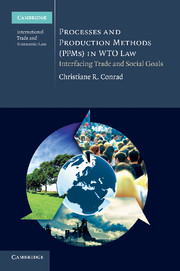Book contents
- Frontmatter
- Contents
- List of figures and tables
- Preface and acknowledgements
- Table of GATT 1947 Reports
- Table of WTO Reports
- List of abbreviations
- Introduction
- I Foundations: the relevance of NPA measures at the interface of domestic regulation, economic globalization and world trade law
- II Legal analysis: reviewing the status of NPA measures de lege lata
- 3 Preliminary considerations: applicability of WTO law and other international law to NPA measures
- 4 Consistency with GATT obligations
- 5 Limits to the justification of NPA measures under the general exceptions
- 6 The status of PPM measures under the TBT Agreement and the SPS Agreement
- III Outlook: new perspectives on the legal status of NPA measures
- Summary and concluding remarks
- Bibliography
- Index
4 - Consistency with GATT obligations
Published online by Cambridge University Press: 05 June 2011
- Frontmatter
- Contents
- List of figures and tables
- Preface and acknowledgements
- Table of GATT 1947 Reports
- Table of WTO Reports
- List of abbreviations
- Introduction
- I Foundations: the relevance of NPA measures at the interface of domestic regulation, economic globalization and world trade law
- II Legal analysis: reviewing the status of NPA measures de lege lata
- 3 Preliminary considerations: applicability of WTO law and other international law to NPA measures
- 4 Consistency with GATT obligations
- 5 Limits to the justification of NPA measures under the general exceptions
- 6 The status of PPM measures under the TBT Agreement and the SPS Agreement
- III Outlook: new perspectives on the legal status of NPA measures
- Summary and concluding remarks
- Bibliography
- Index
Summary
When GATT violations through NPA measures are at issue, recent discussions have tended to focus mainly on justification of those measures under Article XX, while questions on the violation of the GATT are often neglected. One reason for this shift might be the assumption that NPA measures are per se illegal under the GATT, or that the WTO adjudicatory bodies would at least rule to this end. Also, since a view promoted in the earlier debate, namely, that NPA measures are excluded from justification, has lost ground, the attention is now mostly on the precise conditions of justification. Another reason could be the almost general perception that production-based measures are typically used as tools to pursue legitimate national policies, such as protection of the environment, and therefore in principle are justifiable under Article XX. The respondent in one of the classical PPM disputes, Tuna-Dolphin II, shrugged off the pressure to rebut the claims that its measures violated the GATT, and called the whole discussion about violation of the GATT an almost ‘academic exercise’, claiming that the measures were clearly within the scope of the general exceptions and consequently justified. Despite these explanations, it seems that there is a general hesitance when it comes to addressing the issue of a GATT violation. Indeed, related questions eventually touch upon the very core of the GATT, and apparently there is little trust in its ‘load-bearing capacity’.
- Type
- Chapter
- Information
- Processes and Production Methods (PPMs) in WTO LawInterfacing Trade and Social Goals, pp. 147 - 246Publisher: Cambridge University PressPrint publication year: 2011



